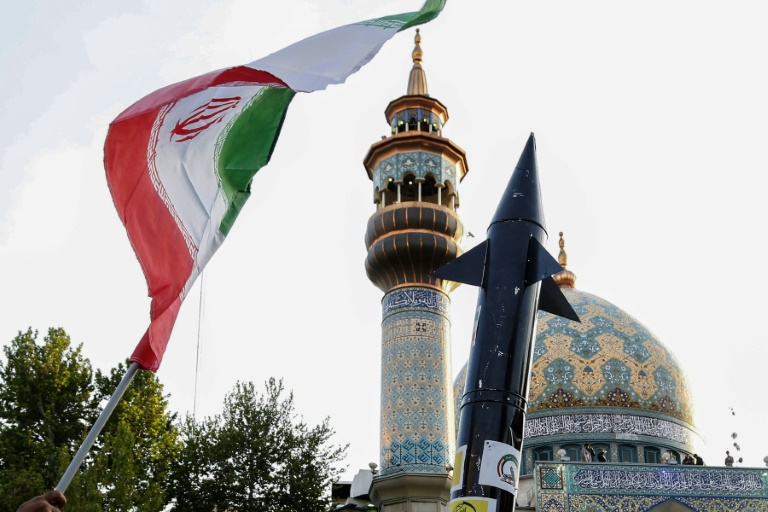Explosions in Iran, US media reports Israeli strikes

Iranians lift up a flag and the mock up of a missile during a celebration following Iran’s missiles and drones attack on Israel, on April 15 2024, at Palestine square in central Tehran
Tehran – Iran’s state media reported explosions in the central province of Isfahan Friday, as US media quoted officials saying Israel had carried out retaliatory strikes on its arch-rival.
Air defence systems over several Iranian cities were activated, state media reported, after the country’s official broadcaster said explosions were heard near the city of Isfahan.
Israel had previously warned it would hit back after Iran fired hundreds of missiles and drones at Israel over the weekend. Most of them were intercepted.
Iran’s Fars news agency reported “three explosions” were heard near the Shekari army airbase in the northwest of Isfahan province, while Iran’s space agency spokesman Hossein Dalirian said “several” drones had been “successfully shot down”.
“There are no reports of a missile attack for now,” Dalirian said on social media platform X.
Nuclear facilities in Isfahan were reported to be “completely secure”, Iran’s Tasnim news agency reported, citing “reliable sources”.
ABC and CBS News reported the strikes had been carried out by Israel, quoting US officials. There was no immediate comment from the White House or Pentagon.
CNN quoted an official as saying the target of the Israeli attack was not nuclear.
The Israeli military told AFP: “We don’t have a comment at this time.”
– Flights suspended –
Over the weekend, Iran carried out its first attack to directly target regional foe Israel.
Israel, backed by its allies, intercepted most of the 300 missiles and drones launched by Iran, and suffered no deaths.
It launched its attack in retaliation for an April 1 strike on its consulate in Damascus that was widely blamed on Israel.
Iran is a key backer of the Palestinian militant group Hamas and Lebanon’s Hezbollah.
Fears of a major regional spillover from the Gaza war have soared since the Iran attack on Israel.
Israeli Prime Minister Benjamin Netanyahu, who has vowed to destroy Hamas over its October 7 attack that started the Gaza war, has stressed that Israel “reserves the right to protect itself” against Iran.
The United States, Israel’s main ally and military supplier, has made clear it would not join a reprisal attack on Iran, but unveiled sanctions against people and entities involved in producing the drones deployed in the Iranian assault.
“We are holding Iran accountable,” US President Joe Biden said Thursday, announcing the measures after the European Union said it would also sanction Iran’s drone programme.
Iranian Foreign Minister Hossein Amir-Abdollahian had warned that Tehran would make Israel “regret” any attack on the Islamic republic.
Flights were suspended across swathes of Iran on Friday.
“Iran’s air defence has been activated in the skies of several provinces of the country,” Tehran’s official IRNA news agency said.
Mehr news agency reported that “flights to Tehran, Isfahan and Shiraz, and airports in the west, northwest and southwest have been suspended.”
Flight-tracking software showed commercial flights avoiding western Iran, including Isfahan, and skirting Tehran to the north and east.
There was no immediate comment from Dubai’s Emirates airline, which was operating several of the planes.
– Mideast ‘on a precipice’ –
Blasts were also reported in southern Syria, according to a local activist group.
“There were strikes on a Syrian army radar position,” said Rayan Maarouf, who runs the Suwayda24 anti-government website that covers news from Sweida province in the south.
On Thursday, UN Secretary-General Antonio Guterres painted a dark picture of the situation in the Middle East, warning that spiralling tensions over the war in Gaza and Iran’s attack on Israel could devolve into a “full-scale regional conflict.”
“The Middle East is on a precipice. Recent days have seen a perilous escalation — in words and deeds,” Guterres told the Security Council.
“One miscalculation, one miscommunication, one mistake, could lead to the unthinkable — a full-scale regional conflict that would be devastating for all involved,” he said, calling on all parties to exercise “maximum restraint.”
Oil prices surged more than three percent in early Asian trade on Friday following the reports of explosions.
